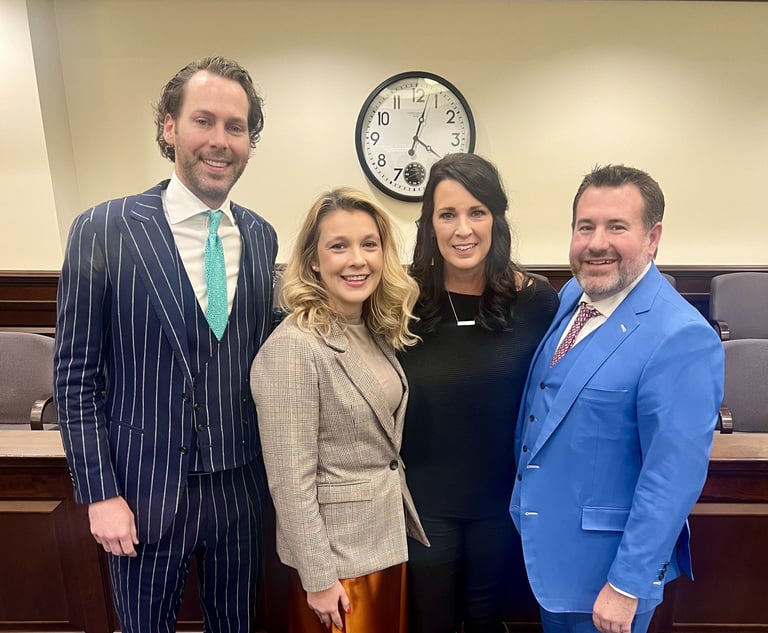3rd Circuit's UIM Ruling Could Send Pa. Auto Insurers Scrambling
A recent decision by the U.S. Court of Appeals for the Third Circuit is likely going to force insurers in Pennsylvania to change how they underwrite commercial auto policies.
March 05, 2020 at 03:41 PM
3 minute read
 Photo: Shutterstock
Photo: Shutterstock
A recent decision by the U.S. Court of Appeals for the Third Circuit is likely going to force insurers in Pennsylvania to change how they underwrite commercial auto policies.
In Slupski v. Nationwide Mutual Insurance, the appeals court invalidated the common practice among carriers of writing policies that offer businesses uninsured and underinsured benefits for fewer vehicles than are covered for liability.
In a nonprecedential March 3 ruling, Judge Joseph Greenaway Jr. wrote that a Nationwide Mutual Insurance Co. policy provided to Phoenixville Tire & Service Co. violated the state's Motor Vehicle Financial Responsibility Law by providing liability coverage to "any auto" but UIM coverage to only autos owned by Phoenixville. The appeals court reversed and remanded a district judge's ruling granting Nationwide's motion to dismiss for failure to state a claim.
Greenaway, joined by Judges Cheryl Ann Krause and Kent Jordan, said the MVFRL requires insurers to provide equal liability and UM/UIM coverage unless the insured has either rejected UM/UIM coverage under Section 1731 or specifically agreed to a reduction of those benefits under Section 1734.
"Based on the record before us (i.e., the complaint and the insurance policy) we find that neither the rejection requirements nor the reduction requirements of either section were met," Greenaway said. "As such, the insurance policy provided by Nationwide failed to comply with the MVFRL by not providing UIM coverage that was coextensive with the policy's liability coverage."
Plaintiff Frank Slupski was an employee of Phoenixville Tire who was injured in an accident while driving a customer's vehicle. He sought both liability and UIM coverage under Phoenixville's policy but was denied the latter because the customer's vehicle was not owned by Phoenixville, according to Greenaway's opinion.
The district court found that Slupski had failed to state a claim upon which relief can be granted because he was not an insured under the Nationwide policy, but Greenaway said the district court failed to examine whether Phoenixville had ever rejected or sought to reduce UM/UIM benefits under Sections 1731 and 1734 of the MVFRL.
"Here, Nationwide did not meet those provisions, and so the policy was void to the extent it conflicts with the MVFRL," Greenaway said. "This means that Slupski should have qualified as an insured because the liability coverage was provided to any auto, and UIM coverage, by default, should have been provided to any auto."
Slupski's attorney, James Haggerty of Haggerty, Goldberg, Schleifer, & Kupersmith in Philadelphia, said commercial policies like the one at issue in this case are the standard in Pennsylvania.
As a result, Third Circuit's decision in Slupski, despite being nonprecedential, is likely now going to force insurers to seek UM/UIM waivers from all of their commercial insureds across the state, Haggerty explained.
"The bottom line," Haggerty said, is that in the wake of this ruling, "these policies all provide UIM coverage that carriers never intended them to."
Counsel for Nationwide, Bradley Vance of Reger Rizzo & Darnall in Philadelphia, could not be reached for comment.
This content has been archived. It is available through our partners, LexisNexis® and Bloomberg Law.
To view this content, please continue to their sites.
Not a Lexis Subscriber?
Subscribe Now
Not a Bloomberg Law Subscriber?
Subscribe Now
NOT FOR REPRINT
© 2025 ALM Global, LLC, All Rights Reserved. Request academic re-use from www.copyright.com. All other uses, submit a request to [email protected]. For more information visit Asset & Logo Licensing.
You Might Like
View All
Harrisburg Jury Hands Up $1.5M Verdict to Teen Struck by Underinsured Driver
3 minute read
Philadelphia Eagles 0-2 in Attempts to Recover Insurance on COVID-Related Losses
4 minute read
High Verdicts and Venue Rule Land Pa. Courts on Top of 'Judicial Hellhole' List
5 minute read
Law Firms Mentioned
Trending Stories
- 1States Accuse Trump of Thwarting Court's Funding Restoration Order
- 2Microsoft Becomes Latest Tech Company to Face Claims of Stealing Marketing Commissions From Influencers
- 3Coral Gables Attorney Busted for Stalking Lawyer
- 4Trump's DOJ Delays Releasing Jan. 6 FBI Agents List Under Consent Order
- 5Securities Report Says That 2024 Settlements Passed a Total of $5.2B
Who Got The Work
J. Brugh Lower of Gibbons has entered an appearance for industrial equipment supplier Devco Corporation in a pending trademark infringement lawsuit. The suit, accusing the defendant of selling knock-off Graco products, was filed Dec. 18 in New Jersey District Court by Rivkin Radler on behalf of Graco Inc. and Graco Minnesota. The case, assigned to U.S. District Judge Zahid N. Quraishi, is 3:24-cv-11294, Graco Inc. et al v. Devco Corporation.
Who Got The Work
Rebecca Maller-Stein and Kent A. Yalowitz of Arnold & Porter Kaye Scholer have entered their appearances for Hanaco Venture Capital and its executives, Lior Prosor and David Frankel, in a pending securities lawsuit. The action, filed on Dec. 24 in New York Southern District Court by Zell, Aron & Co. on behalf of Goldeneye Advisors, accuses the defendants of negligently and fraudulently managing the plaintiff's $1 million investment. The case, assigned to U.S. District Judge Vernon S. Broderick, is 1:24-cv-09918, Goldeneye Advisors, LLC v. Hanaco Venture Capital, Ltd. et al.
Who Got The Work
Attorneys from A&O Shearman has stepped in as defense counsel for Toronto-Dominion Bank and other defendants in a pending securities class action. The suit, filed Dec. 11 in New York Southern District Court by Bleichmar Fonti & Auld, accuses the defendants of concealing the bank's 'pervasive' deficiencies in regards to its compliance with the Bank Secrecy Act and the quality of its anti-money laundering controls. The case, assigned to U.S. District Judge Arun Subramanian, is 1:24-cv-09445, Gonzalez v. The Toronto-Dominion Bank et al.
Who Got The Work
Crown Castle International, a Pennsylvania company providing shared communications infrastructure, has turned to Luke D. Wolf of Gordon Rees Scully Mansukhani to fend off a pending breach-of-contract lawsuit. The court action, filed Nov. 25 in Michigan Eastern District Court by Hooper Hathaway PC on behalf of The Town Residences LLC, accuses Crown Castle of failing to transfer approximately $30,000 in utility payments from T-Mobile in breach of a roof-top lease and assignment agreement. The case, assigned to U.S. District Judge Susan K. Declercq, is 2:24-cv-13131, The Town Residences LLC v. T-Mobile US, Inc. et al.
Who Got The Work
Wilfred P. Coronato and Daniel M. Schwartz of McCarter & English have stepped in as defense counsel to Electrolux Home Products Inc. in a pending product liability lawsuit. The court action, filed Nov. 26 in New York Eastern District Court by Poulos Lopiccolo PC and Nagel Rice LLP on behalf of David Stern, alleges that the defendant's refrigerators’ drawers and shelving repeatedly break and fall apart within months after purchase. The case, assigned to U.S. District Judge Joan M. Azrack, is 2:24-cv-08204, Stern v. Electrolux Home Products, Inc.
Featured Firms
Law Offices of Gary Martin Hays & Associates, P.C.
(470) 294-1674
Law Offices of Mark E. Salomone
(857) 444-6468
Smith & Hassler
(713) 739-1250





